
China India (Photo: Xinhua)
Chinese experts blasted Indian media for their sensational coverage of India's illegal exploration of uranium in South Tibet, reflecting their stubborn position of taking the occupation of China's territory for granted, and warned that such illegal behavior will only complicate China-India border talks.
Citing an Indian official, influential media outlet Times of India published the story with a headline "In a first, India set to explore uranium reserves in Arunachal" on Tuesday.
It quoted D.K. Sinha, director of Atomic Minerals Directorate for Exploration and Research, as saying there had been "positive results" for uranium yield and further activity would continue.
India claims this area is its territory, but the Chinese government has never recognized "Arunachal Pradesh," which is referred to as the southern part of Tibet or Zangnan in China.
So-called "Arunachal Pradesh" was founded illegally in the last century and occupies about 90,000 square kilometers of Chinese territory.
"What counts is not whether the region is rich in uranium minerals, but their arrogant gestures of claiming the region as their own territory and hyping up border disputes," said Xie Chao, an assistant professor of Indian studies at Tsinghua University, who called on China to take countermeasures against India's evil intentions.
Experts warned that India's hyping up and aggressive move will only complicate China-India border talks that aim to solve border disputes, as the previous standoff demonstrated that unilaterally provoking trouble is not conducive to bringing the two sides back to the negotiating table.
Relations between China and India have nosedived since a deadly confrontation in the Galwan Valley last year.
India's exploration of minerals in southern part of Tibet in China is illegal, and is a stubborn manifestation of India's mindset of occupying the disputed area to justify its claims, said Qian Feng, director of the research department at the National Strategy Institute at Tsinghua University, adding that it will make future China-Indian border negotiations more difficult if friction over the border issue is constant.
The call to search for uranium could be seen as spiritual encouragement for India domestically, as the country lacks uranium reserves and relies on imports, Qian said.
Prior to this claim, India's nuclear industry departments and media claimed many times that they had discovered "large uranium mines" and that India could be self-sufficient in uranium, but it still heavily relies on imports from countries such as Kazakhstan and Australia, Qian said.
India has begun making great efforts to find uranium and develop its nuclear capabilities since it started to build nuclear reactors in the 1960s, but its uranium reserves are small and of poor quality, accounting for 0.8 percent of the world's reserves, the expert noted.


